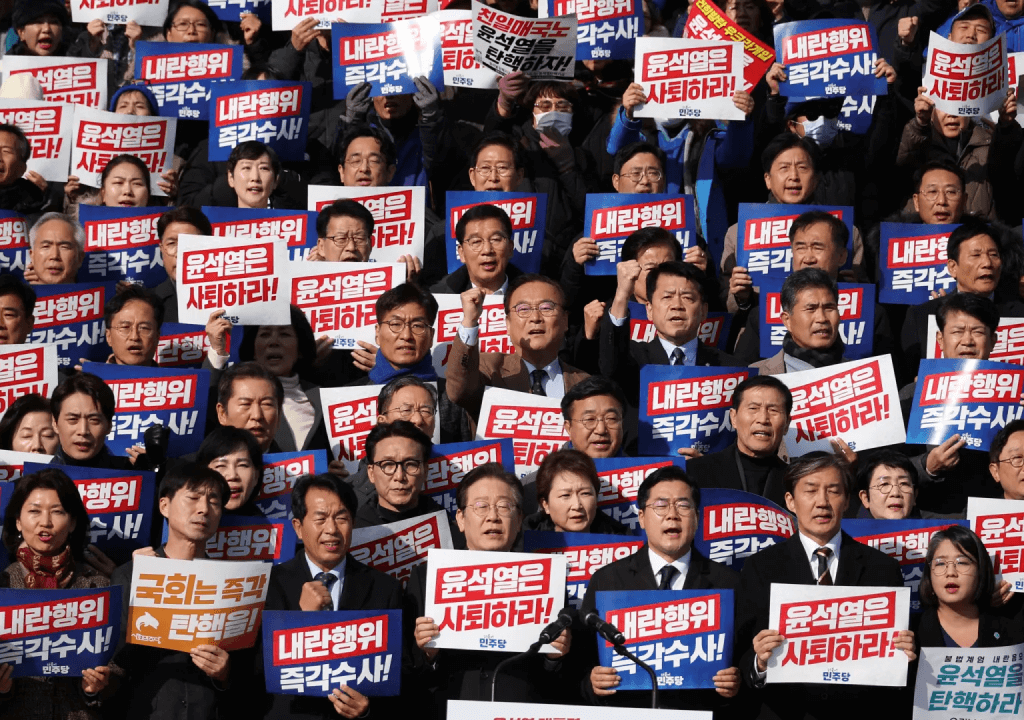Western media often portray South Korea as a model success story in Asia. The nation thrives across multiple dimensions, a robust economy, a functioning democracy, and global cultural influence—drawing comparisons to the United States. Its steadfast alliance with the U.S. further strengthens this narrative. However, recent events have exposed cracks in this success story, particularly within South Korea’s political landscape. Polarization and volatility have reached toxic levels, posing serious challenges to the country’s democratic framework. The situation worsened when President Yoon made the controversial decision to declare martial law, seemingly on impulse, triggering widespread protests.
In democracies where voters elect the president and parliament separately, political rifts often arise when opposing parties control the two branches. This defines South Korea’s current political struggles.
President Yoon Suk Yeol, a conservative leader from the People Power Party, currently holds the presidency while facing a parliament led by the opposition Liberal Democratic Party. Although Yoon lacks a parliamentary majority, he has the authority to appoint the government, resulting in an administration run by his party, which is in the minority in parliament. Any decision made by the president or the ruling party requires parliamentary approval, but the opposition-dominated legislature consistently blocks their initiatives.
Yoon, relatively new to politics despite his reputation as a well-known prosecutor, struggles to navigate this challenging situation. Narrowly elected in 2022 as a candidate for a party founded just two years earlier, he has faced widespread criticism for his confrontational rhetoric and polarizing comments, particularly against the opposition. These actions have only deepened the political divide and fueled ongoing disruptions.
The political situation worsened as South Korea’s economy faltered, living conditions deteriorated, and wages stagnated, sparking ongoing protests such as the doctor’s strike. Many believe the growing divide between parliament and the president has hindered swift action to stabilize the economy and implement effective policies. Polls show that this dissatisfaction has impacted the president more than the opposition. Yoon’s People Power Party struggled to gain traction in the recent parliamentary election, leaving the opposition in a stronger position.
The president and parliament openly blamed each other for the country’s economic struggles, with both sides accusing the other of complicity. The rivalry extended beyond economic issues—Yoon accused the opposition of having ties to North Korea, while the opposition alleged he harbored admiration for imperial Japan, the country that once colonized Korea. Tensions escalated further as parliament slashed the government’s budget, and investigations into alleged corruption involving Yoon’s wife added to the political turmoil.
The situation reached a breaking point when Yoon declared martial law last Tuesday night, deploying the military to block opposition members from entering parliament and attempting to suppress dissent. After hours of confrontation, the opposition passed a resolution to lift martial law. By early morning, Yoon abruptly ended the decree. This dramatic series of events exposed the intensity of the rivalry between the president and the opposition, as well as the fragility and volatility of South Korea’s political system, on a single chaotic night.
The night and following day were marked by widespread calls for President Yoon’s resignation, with the international community largely expecting it. However, the situation grew more complex. While members of the ruling party condemned the imposition of martial law, they opposed the president’s resignation. Meanwhile, massive public protests flooded the streets, and the opposition began impeachment proceedings. Although the opposition holds a parliamentary majority, some twists and turns are expected if he is not ready to agree to the procedure.
Despite the ruling party’s opposition to impeachment, the opposition remains confident it will pass. All eyes are now on President Yoon, with speculation about how he will respond—whether with restraint or another impulsive action. The main opposition Democratic Party has scheduled an impeachment vote for Saturday evening. Meanwhile, the national police have launched an investigation into Yoon after opposition leaders and activists filed allegations of insurrection. The political climate in South Korea is intensely heated this winter, with protests from both sides and the potential for more dramatic actions, echoing the chaos of the night South Korea fell under martial law. Kim Jong Un will likely enjoy this K-drama.








